Throughout history, we have seen new technologies and innovations that have revolutionized our everyday lives. The invention of the cellular telephone in 1973 has changed the way we communicate, and with the advancement in smartphone technology, we have access to a vast wealth of information through a device that fits into the palm of our hand. What is considered one of the most incredible inventions in modern history, however, has created a massive fissure in an already problematic educational system.
The article, ‘Tackling Tech: How some Ontario teachers are attempting to limit students’ cellphone use’ looks at how an Ontario High School began using individualized pouches (specifically Yondr pouches in this case) students can store their devices in while in the classroom as a means to limit distractions and curb use. According to the article, teachers have seen the method of these pouches have proven to be more effective at curbing cell phone use than a total ban. already noticed an increase in the grade point averages for the classes using these pouches. An obvious observation, by students not having access to their phones during instruction time, they are much more attentive, engaged and less distracted. The result; a deeper understanding of the classroom material and better grades.
and better grades.
Teachers argue both sides. There are those that see the positive aspects as a result of devices in the classroom, like how manipulating technology efficiently and effectively can enrich and deepen their learning with a growth mindset, as much as it can improve their learning experience. Also, there are those that think we should ban cellphones completely, saying cell phones are nothing but a constant distraction from the lesson at hand and make it near impossible for the teacher to maintain control of the classroom and ensure students are paying attention.
It is not surprising to hear that many schools who have implemented ways of limiting use in the classroom without an outright ban are seeing increases in grade point averages. At the beginning of the academic year, France implemented a complete ban on mobile phones on school property in an attempt to maximize learning time. To me, this seems extreme, however I can see how it could benefit the school, the students, and the community culture as well. Many schools are allowing teachers to create their own regulations based on their teaching philosophy, putting in place rules that align well with their classroom and the environment they have created. I feel as though this approach affords educators that flexibility and students some variability from year to year or classroom to classroom.
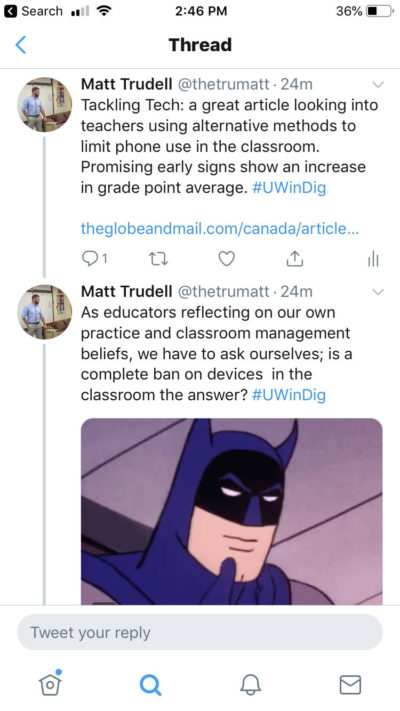
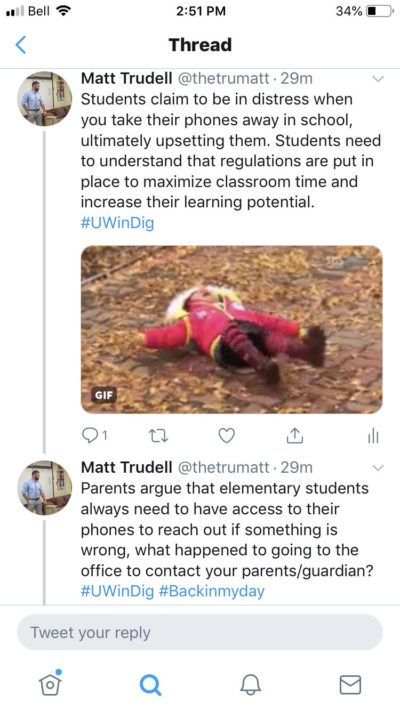
A common issue I have seen when students late in elementary school years (grades 7 & 8) have unlimited access, is the ability for students to bully other students and go undetected by teachers or other adults. This can go on for a long time, while students can harass and bully other students without any means of discipline. I had a grade 8 student who came to me after a few weeks of being quiet and reserved. I asked him if anything was going on or if he wanted to talk about anything at all. As it turns out, this student was being bullied on Twitter, Facebook, Instagram and snapchat for the last few weeks after a picture was posted from another student in the class, where this male student looked like they had their hand near another male student’s genitals. Of course, after analyzing the picture it was clear the student was not making contact but was caught in an unfortunate pose. After bringing this up to my Associate Teacher and the Administration, an investigation into the bullying of the student took place. Those responsible received in-school suspensions. After this, the school continued to operate under their ‘bring-your-own-device’ policy that had in place prior to the incident. Students always had access to their devices; in classrooms, halls and the yard. I found instructing to be extremely difficult. In this eighth grade class, I had to continually ask students to put their phones away, most of the time texting or sharing inappropriate content with other students.
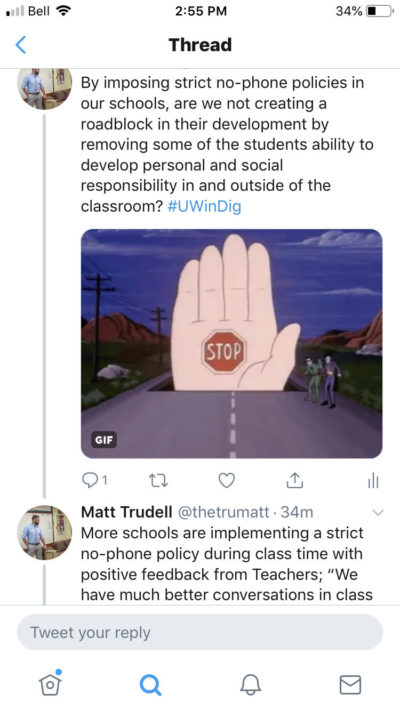
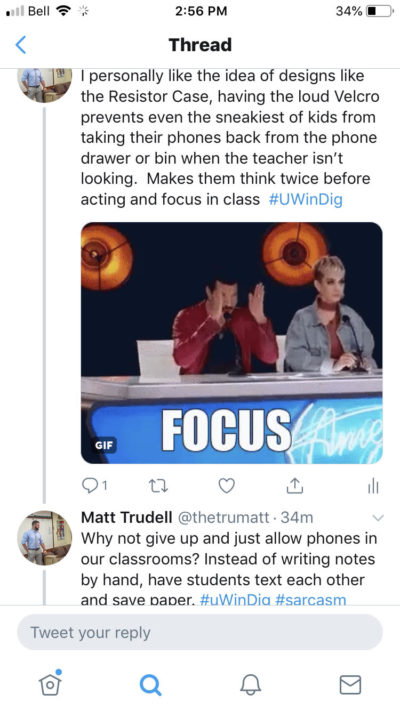
Prior to looking at the article, I felt very strongly that students should not have their cellphones in the classroom at all. Upon hearing the alternative approaches to limiting use, I feel as though there should be no out right ban, but the decision on restricting use remains with the teacher. This is partially due to my own experience in my teaching placements and past supply teaching, as well as the data that clearly shows an increase in student performance and grade point average as soon as devices like the Yondr or The Resistor Case (are implemented in the classroom. I am a particular fan of the Resistor Case as their site offers a step-by-step guide on how to build your own simple version of the case as well as the option to buy one of their completed units. Reflecting on my own views, this article has helped fortify my beliefs about restricting cellphone use in the classroom. Even though cellphones can be great learning manipulatives for various applications and functions, the reality is that many students (especially in the elementary system) lack the maturity and discipline to stay focused in the classroom with their device at their fingertips. Albeit, I haven’t had any experience at the high school level. At this point, I feel like we need to embrace digital devices, as the students need to develop the right self-regulation habits that will prepare them to enter the workforce and understand when and when not to be using your device.
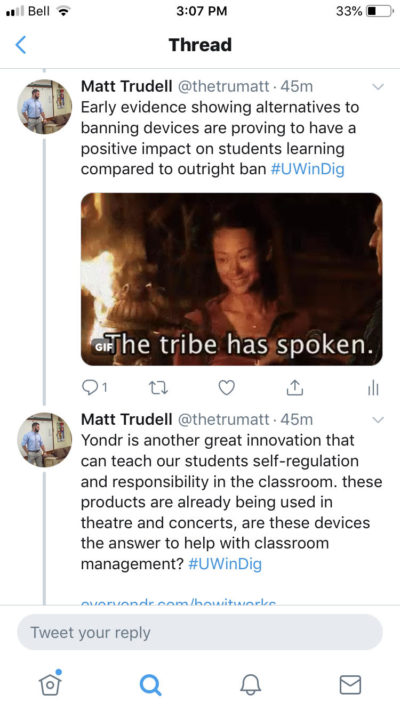

Look at the adults around you… we have all become completely absorbed by our devices.  I know I was appalled when the Screen time application was installed on my IPhone. If we don’t restrict children’s use of cellphones at the elementary level for at least some duration of the day, while many of them have no time limits at home, how dependent will this generation be on their devices when entering the work force? Looking back, this is part of the reason I felt like a ban was necessary to begin with; we are becoming too reliant on our devices, however, by implementing self-regulation methods and giving the students a chance to be instrumental in their own learning, we can assure the next generation of youth are prepared and cognizant of their use of devices.
I know I was appalled when the Screen time application was installed on my IPhone. If we don’t restrict children’s use of cellphones at the elementary level for at least some duration of the day, while many of them have no time limits at home, how dependent will this generation be on their devices when entering the work force? Looking back, this is part of the reason I felt like a ban was necessary to begin with; we are becoming too reliant on our devices, however, by implementing self-regulation methods and giving the students a chance to be instrumental in their own learning, we can assure the next generation of youth are prepared and cognizant of their use of devices.
– Matt
#UWinDig
